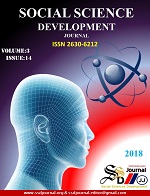AN ASSESSMENT ON STATE THEORIES
DOI:
https://doi.org/10.31567/ssd.131Keywords:
State Theories, State Centered Approach, Community Centered Approach, Conflict, ConsensusAbstract
The phenomenon of the state, which comes up in many points of social and political life, is often used in a Weberian
definition. However, how the state should be defined in the real sense, which features it has, and whether it is a tool or a
completely independent device are among the issues to be discussed. As a matter of fact, these debates have continued since
the state emerged. Many approaches to this issue have various evaluations.
Within the scope of this study, theories which have various evaluations related to the state were analyzed and analyzed in
certain aspects. In this study, it is tried to gain a different perspective to the analyzes made about the state. State theories have
been subjected to some sort of classification according to their specific characteristics. First of all, it was evaluated that the
theories of the state centered the state or society in social reality researches. The basic criterion here is whether the state has
autonomy on certain issues. More precisely, the state is a tool or an actor. Another important point to be investigated with this
study is that the theories of the state have a social conflict or a compromise. The main criterion used in researching this is the
state theory's response to the power (power) distribution within the social structure and on the whereabouts of power. The
evaluations made and the results achieved with this study aim to look at the state theories in a different window and contribute
to the literature.




